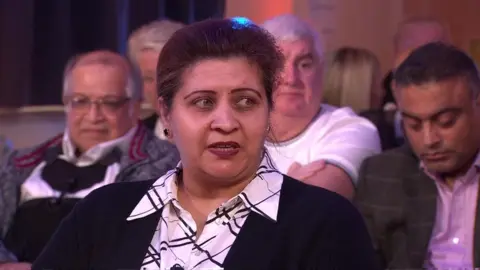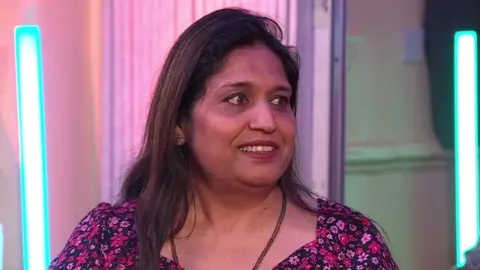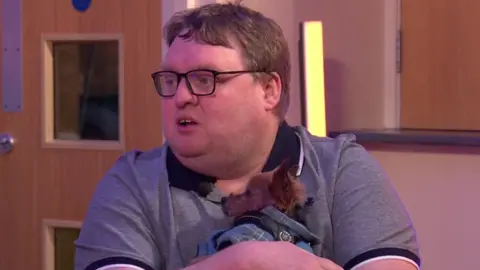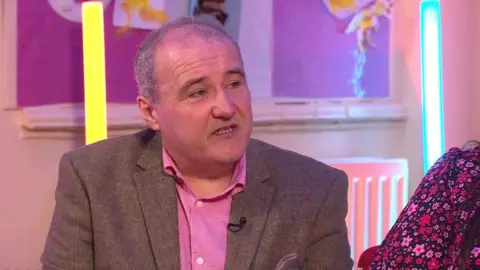Jail those responsible for Post Office scandal - minister
The Post Office minister has told the BBC that those responsible for the Horizon scandal "should go to jail".
Kevin Hollinrake told a BBC Breakfast audience of sub-postmasters that "people should be prosecuted" when evidence is "established", and "people within the Post Office, possibly further afield, should go to jail".
More than 700 people were prosecuted by the Post Office between 1999 and 2015.
To date, just 37 have received full and final compensation settlements.
Mr Hollinrake's comments follow those of Alan Bates, whose campaign and battle against the Post Office was dramatised in an ITV mini-series earlier this year.
"People have got to be held accountable," the former sub-postmaster previously told the BBC. "That's got to happen. And we're going to have to carry on campaigning for that to occur."
Mr Bates said the campaign group would "start looking at prosecutions" after the public inquiry into the scandal ends, adding that some of the bonuses paid to Post Office bosses over the years should be "clawed back".
The public inquiry will resume on Tuesday. The latest hearings will last 15 weeks, and witnesses will include key figures at the heart of the scandal - including Mr Bates and former Post Office chief executive Paula Vennells.
Hundreds of sub-postmasters were prosecuted for theft and false accounting by the Post Office - which is owned by the government - based on a faulty accounting software system called Horizon. Many poured in their own life savings to cover shortfalls in the accounts.
The Post Office scandal is widely regarded as the most widespread miscarriage of justice in British legal history. The government is introducing legislation to overturn the convictions of sub-postmasters linked to Horizon.
Mr Hollinrake admitted on Monday that wrongly prosecuted sub-postmasters and sub-postmistresses were not being compensated quickly enough, and that the process of financial redress needed to be simplified.
"We do need to compensate people, that's the first thing we need to do and we haven't been compensating people quickly enough. We need to accelerate that," Mr Hollinrake said on the BBC Breakfast programme, which was broadcast from Fenny Compton, the Warwickshire village where Mr Bates convened the first gathering of sub-postmasters in 2009.
There are also three main compensation schemes aimed at groups of victims who had different experiences of the scandal. The Post Office has further details on the scheme on its website.
The government has provided funding to the Post Office for these payments, but MPs have warned that the Post Office is "not fit" to run any compensation scheme, that it is removed from involvement, and replaced by a new independent body.
Mr Hollinrake told the audience: "We need to simplify the process is what we need to do. If you've had a conviction then you can go down two routes - the fixed sum award of £600,000 which you get pretty much immediately or the full assessment route [which is] is more complicated, it does take more time. We are keen to make that as streamlined as possible."
David Morley, a former sub-postmaster, said that in 2001: "I proved in front of Post Office managers and in front of Fujitsu managers that the system was faulty and they did have remote access to postmasters' accounts. Now my question to you sir is do you think evidence of that meeting was deliberately suppressed?"
Mr Hollinrake said he couldn't say if it was deliberately suppressed "because I wasn't there and wasn't party to the conversations afterwards but someone knew something at a very early stage".
'Broken promises'

Many Post Office victims who appeared on the programme became emotional when telling their stories.
Jess Kaur was a postmistress in Walsall in the West Midlands and suffered a mental breakdown after being wrongly accused in 2009 of stealing £11,000.
"When I was in hospital, the Post Office sent their own doctors to see if I was actually ill. And that's what really hurt the most," she recalled.
Other former postmasters gasped as she said the Post Office did not believe she was in hospital for having a mental breakdown. Charges against Ms Kaur were dropped in 2011, but she said there had been "too many broken promises" for her to know when the final "win" would happen for her and others falsely accused.

Seema Misra was sent to prison while she was pregnant. She was a sub-postmistress in West Byfleet, Surrey, and was wrongfully accused of stealing £70,000.
Although she was cleared in 2021, she said she was "still fighting on til the proper accountability is done".
On the day she was sentenced it was her son's 10th birthday. "We did not know what to say to him. We told him because mummy's pregnant she's just gone to a special hospital."
On the morning she was due to go to court, she had said to her son that she would see him later that day. "Why would someone send me to prison for a crime I never committed?" she said tearfully.

Mark Kelly was a sub-postmaster in Swansea from 2003 to 2006, and came to the BBC studio with his support dog Gizmo who helps keep him calm after the anxiety resulting from being wrongfully accused of false accounting.
He said he felt like he wanted to take his own life, and became depressed and isolated.
"Once I started hearing about all the problems which other postmasters were having, like people committing suicide and people going to prison when pregnant, I started to feel quite guilty from it all. I felt like I could have done something more [to help others]," he said.

Lee Castleton was left bankrupt in 2007 after losing a legal battle with the Post Office who falsely accused him of stealing £25,000 from the branch he managed in Bridlington, East Yorkshire.
He was played by the actor Will Mellor in ITV's drama about the scandal.
"The journey for all of us has been so painful. We still have to give each other support because it's not over, it's still ongoing," Mr Castleton said.
He said he still finds it hard to get up each morning. "I can't believe what we've been through."

BBC Breakfast came live from Fenny Compton, the village where former sub-postmasters held their first meeting, on Monday. The programme brought together 60 people whose lives have been changed by the scandal.
You can watch the programme on BBC iPlayer.

